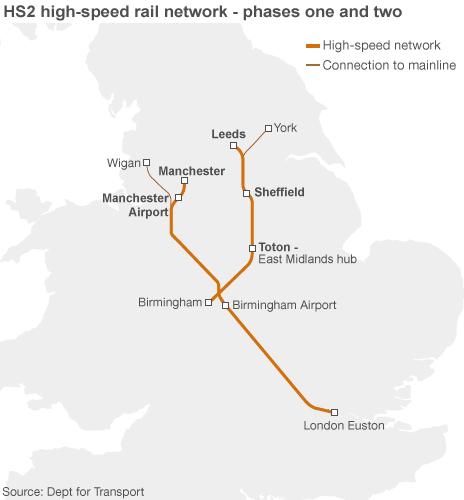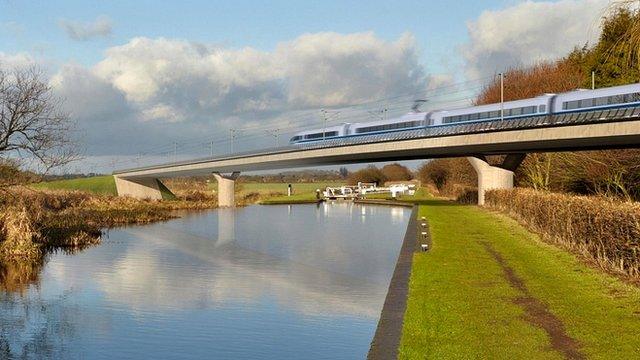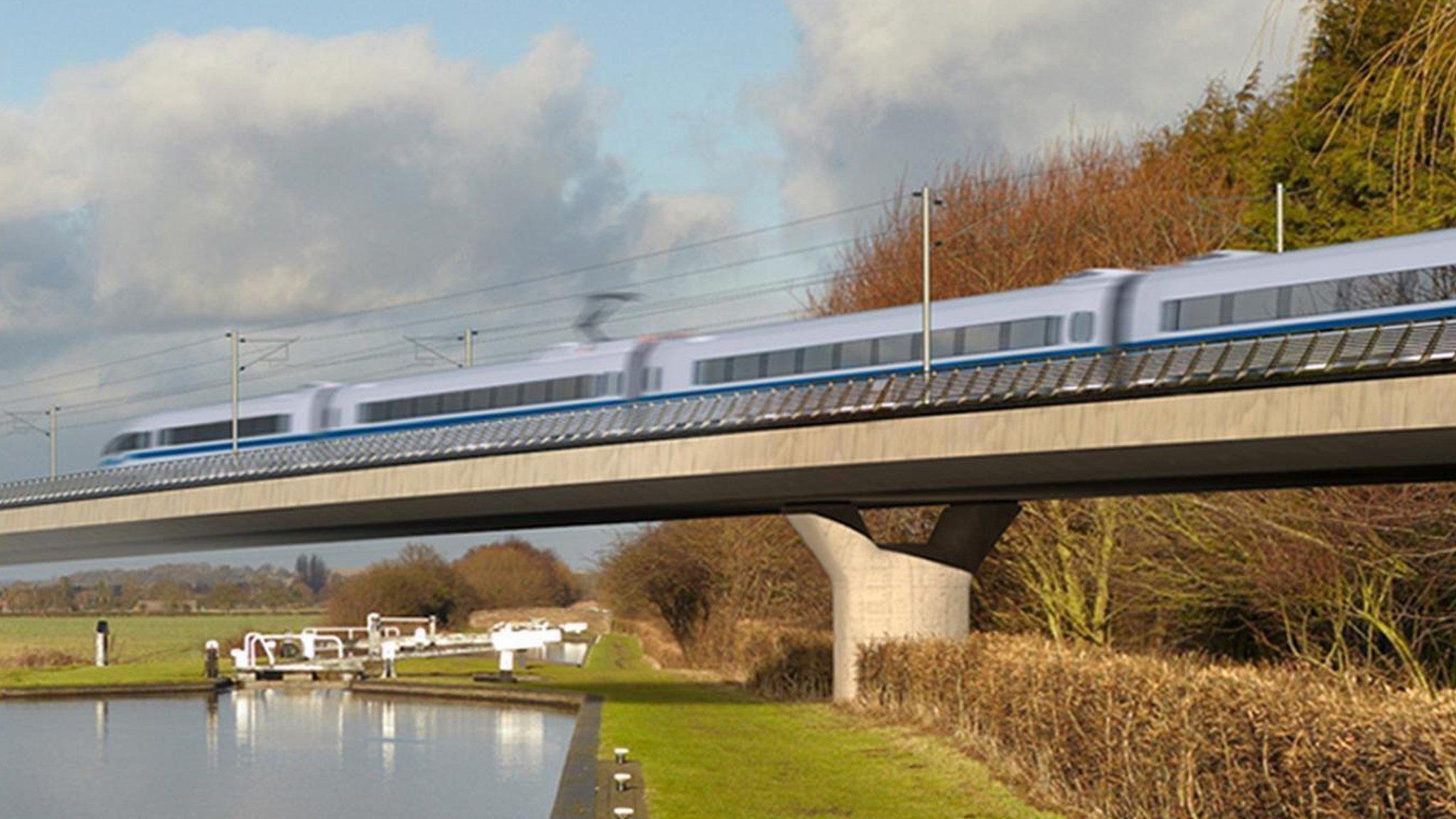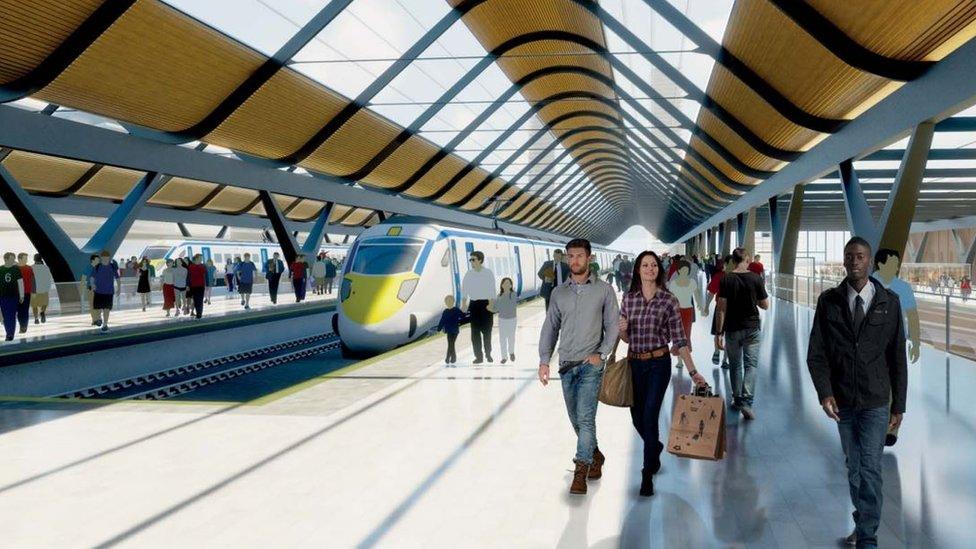HS2: Businesses 'not convinced' of economic benefits
- Published
The IoD's Director General describes HS2 as "one grand folly"
A leading business lobby group has called on the government to abandon its controversial high-speed rail project.
The Institute of Directors (IoD) said a survey of its members showed businesses were unconvinced by the economic case for HS2.
The IoD's director general, Simon Walker, described the project as "one grand folly".
In response the government said the HS2 project was forecast to generate billions in economic benefits.
HS2, which stands for High Speed Two, is intended to allow trains to run at 250mph (400km/h) from London to Birmingham from 2026, with branches to Manchester and Leeds via Sheffield planned by 2032.
The government says it expects the project to cost £42.6bn. But the Institute of Economic Affairs, a think tank, has suggested it could rise to more than £80bn.
The Department for Transport (DfT) also claims the project will generate £50bn in benefits to the UK economy, helping job creation and creating investment opportunities.
But the IoD said a survey of its members showed that just 27% felt the project represented good value for money.
Transport Minister Norman Baker: "The IoD is not aware of the facts"
Costs 'critical'
Some 70% said the scheme would have no impact on the productivity of their business.
Fewer than half (41%) rated HS2 as important to their business - that is down from 54% in a similar survey conducted in August 2011.
"Businesses up and down the country know value for money when they see it, and our research shows that they don't see it in the government's case for HS2," said Mr Walker.
"Overall there appears to be little enthusiasm amongst IoD members, not even in the regions where the benefits are supposed to be strongest.
"We agree with the need for key infrastructure spending, but the business case for HS2 simply is not there... it is time for the government to look at a thousand smaller projects instead of falling for one grand folly."
He added that the cost-benefit analysis was conducted before laptops and tablet computers became commonplace, and as a result suggested time spent on trains was wasted.
"The fact is more than half our members say they spend all of their time on trains working," Mr Walker told the BBC's Today programme. "For many of them it's as productive as the time they spend in the office."
HS2 has divided opinion, even among the business community. The British Chambers of Commerce, another business lobby group, said it remained supportive of the project, though a spokesperson told the BBC it was "critical" that costs were kept under control.
The CBI has also voiced lukewarm support. Director general John Cridland said it supported HS2 "in principle" but that "it must be demonstrably clear that the benefits outweigh the costs".
A DfT spokesman said the HS2 Growth Taskforce would "work with city and business leaders to ensure we are capitalising on every opportunity to help regeneration, job creation, investment opportunities and in building a skilled UK economy".
Without HS2, he said, "our existing rail network will be full by the mid-2020s at a cost to passengers and businesses up and down country".
'Building monuments'
The project has the backing of the major political parties, but is opposed by many backbench MPs.
Labour has placed a £50bn cap on the cost of the project.
In an interview with the Sunday Times, shadow transport secretary Maria Eagle said her party continued to support the project but its backing was conditional on costs being kept under control.
"I am not willing to see this project start draining money from other vital rail projects - it's got to be delivered within the current budget," she said.
"Nobody who is delivering it should be under any illusions that I will allow it to go up and up."
The IoD's survey included 1,323 members, surveyed online earlier this month.
Simon Walker said smaller infrastructure projects would do more to boost businesses and suggested HS2 was about political legacy as much as economic benefits.
"Politicians love building monuments to themselves," he told the BBC.
But Alison Munro, the chief executive of HS2 Ltd, the company charged with delivering the high-speed network, said HS2 was the only way to bring about a "transformational change".
"While smaller schemes may have higher benefit cost ratios, by their very nature they only make small improvements to capacity and often just move the bottleneck elsewhere on the network," she said.
"There is no other alternative that delivers the benefits of HS2."

- Published24 August 2013

- Published23 August 2013

- Published21 August 2013

- Published18 August 2013

- Published24 July 2013

- Published26 June 2013

- Published6 October 2023

- Published9 July 2013

- Published1 July 2013
